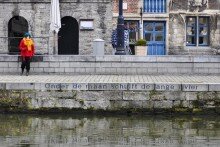Does Belgian poetry exist?
Nederlands ►
The word Belgian is generally used to talk about world-famous beer and chocolate, but not in connection with poetry. In a politically complex country such as Belgium it is almost inconceivable to talk about Belgian poetry. Belgian poetry does not exist.
In Belgium you have German-language, French-language and Dutch-language poetry. French-language poetry from Belgium is also referred to as ‘Walloon’ poetry, while Dutch-language poetry from Belgium is in turn called ‘Flemish’ poetry. In works of literary history, they are included in French and Dutch literature respectively.
Nonetheless, things were once different. There were, for example numerous Flemish poets in the last century who wrote in French, such as Emile Verhaeren and the former winner of the Nobel Prize for literature Maurice Maeterlinck. At the time, these French-language Flemings were genuine Belgian poets in the eyes of the outside world; today, they are mostly to be found in histories of French literature.
A century ago, however, most Flemish writers were naturally already writing in Dutch. This did not make much of an international impact, though, since it took a long time before the Dutch spoken in Flanders inside and outside the borders of the country could enjoy the status of a civilised language. Belgian Dutch – so-called Flemish – was for decades mainly considered to be a vernacular language. Today, things are slightly different. In the course of the past 150 years, Flanders has undergone a real language movement which has led to the culture as well as the country becoming federalised. In that way, such a concept as ‘Belgian poetry’ would seem to have become an anachronism.
And so a few literary eyebrows were also raised when a French publisher in the spring of 2005 published the book Ici on parle flamand & français. Une fameuse collection de poèmes belges (Flemish and French spoken here. A famous collection of Belgian poems). No one had actually used the phrase ‘Belgian poetry’ in years. On the back cover of the anthology in question, so-called Belgian poetry was characterised as being ‘tender, amusing or rebellious’. These three adjectives are quite often used when characterising a Belgian. Belgian characters in films, novels and comic strips always have something tender, amusing or rebellious about them. Just think of Tintin, Hercule Poirot or Maigret. The same applies to the work of two of Belgium’s most famous painters: René Magritte and James Ensor.
The last Belgian poet died in 1979: Jacques Brel. The world-famous chansonnier made himself immortal with brilliant French-language songs such as ‘Ne me quitte pas’, known in the Anglo-Saxon world as ‘If you go away’, as performed by, for example, Frank Sinatra. But, being a true Belgian, Brel used occasionally to sing a number in the language of the Flemings. He was both tender, amusing and rebellious. But he was so much of a Belgian that the French annexed him as their singer and practically everyone nowadays thinks that he is a Frenchman. The last of the Mohicans in the anachronism that is Belgian poetry.
So launching a website on Belgian poetry is like holding a three-headed monster over the baptismal font. Flemish poets are normally regarded as the stepbrothers and sisters of ‘Dutch’ poets. That is not all that surprising: although they often work in a completely different tradition, they make use of the same language. Moreover, most Flemish poets publish in Amsterdam – the mecca of the literary publishers in the Low Countries. For the same reasons, Walloon poets are thought of as belonging to French poetry. German-language poetry from Belgium is somewhat smaller in extent: there are about 70,000 German-speaking Belgians – three of them are active as poets and use a regional publisher.
But Belgium would not be Belgium if that three-headed monster came alive in one breath. The three-headed monster is a triplet, only one of which can be born today. For this website will, for the time being, mainly shed light on the Flemish or Dutch-speaking poets from Belgium. You will have to wait a while for a larger selection of French and German poets.
Want to read more thoughts about this question? Read Benno Barnard's article on the existence of Belgian poetry here.









